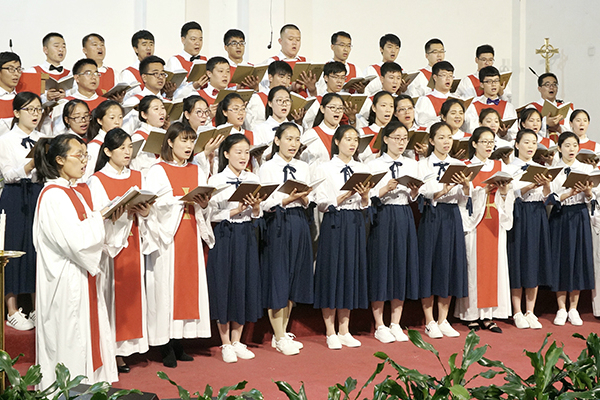As the Chinese Constitution guaranteed religious freedom since 1981, Nanjing Union Theological Seminary (NUTS), the country's only national theological seminary which was founded in 1952, was reopened in Nanjing that February. Bishop K.H.Ting was its president.
There are 23 registered Protestant seminaries in mainland China, most of which are provincial-level. In addition, local CCC&TSPMs and churches run some Bible schools and theological training centers to train more workers of God in one or two years.
Rev. Gao Feng, NUTS' president, said that the seminary, from 1981 when it was reopened to 2016, had trained over 2,000 full-time theological graduates, over 200 post-graduates for further pastoral education, and over 6,400 students who attended correspondence courses. From the school year of 2016 to 2017, full-time students at school numbered 374.
It is the commencement season now. According to the official website of NUTS, 108 people graduated from the seminary with bachelor's and master's degrees this spring semester. By the year of 2020, a batch of NUTS' s students will become the first Ph.D. theological graduates.
Seminary life
Candidates for registered seminaries must be recommended by their local churches to the provincial, municipal, or autonomous regional CCC&TSPM and required to attend church activities for at least one year. It can be concluded that every theological student has his or her church.
It's known that most students from the countryside have financial disadvantages. Ke Lv, a contributor of the Christian Times, an online Chinese Christian newspaper, stated that overall speaking, theological students live in harsh conditions. Students from southern China had better family backgrounds than those from the north.
"I went to study in a seminary in 2012. In the vacation of 2013, my classmate and I bought two coats each at the price of 20 yuan in the county town. Last year, I still saw him wear that coat on WeChat. Theological students from the north couldn't afford clothes or cosmetics and even used cell phones of inferior brands worthy of 300 or 500 yuan... They themselves are more than on a tight budget, whose families are also very poor."
In recent years, churches, laypersons, and ministries have launched campaigns to set up grants for seminary students who shall be aided with monthly funds ranging from several hundred to one thousand for one or two years and even until graduation. But this is not enough.
Preacher Zhang who is a graduate of Henan Bible School said that most students were partially funded by their churches. He shared how theological students spent their weekly life.
A week started with a one-hour long morning reading at 6 a.m. The daytime was filled with courses, followed by night study. An hour worship was held on Mondays, Wednesdays, and Fridays. The sermons were preached by junior students for practice. Each class meeting was conducted on Sunday evenings. As a unit, a theological class served in a choir at weekends.
When it came to summer or winter holidays, most students returned to serve in their hometown churches; but students who paid all their own expenses didn't have the chance to serve. In addition, in general, they were asked to join in Christian camps.
What seminaries give and lack
In a survey about seminary graduates conducted by the Gospel Times, another daily Christian news website in China, 109 out of 138 respondents claimed that theological study was "very helpful" to them.
The survey also showed that the help theological programs provided to them were "systematically learning Biblical truth and faith", "broadening their horizons", "spiritual growth", "knowing co-workers", "acquiring methods of Bible interpretation", "being able to discern the truth", "finding one's gifts", "realizing one's shortcomings", and "changed values", etc.
For the last question - what seminaries fail to achieve in cultivating students, the answer "life" was given the most. About 20 people said that there was a lack of spiritual influence and spirituality fostering in seminaries that focused on teaching knowledge.
"A lack of practice" was another common problem. Other problems included "not down-to-earth teachings", "separation from society", "seminaries and churches knowing little about each other", "disqualified teachers", "students with low educational backgrounds", "lacking a follow-up of theological graduates"and "insufficient practical courses like marriage, management, psychology, worship and praise, liturgy, and audio technique".
Brother Yao who works in Beijing Gospel Mission Church went to a seminary with the intention of responding to God's calling - to be a missionary. He said that seminaries only paid attention to the teachings of the truth and theological knowledge, neglecting to shape the characters of theological students. This resulted in the pride and arrogance inside some graduates who boasted about what they learned. It was hard for them to build relationships of faith and love with church workers or to be committed to serving in a church.
Preacher Zhang said the bottleneck for some provincial seminaries was that their students were not professional in theology and not good at thinking. He added that pastoral and psychological counseling was also urgently needed.
After graduation
After graduation, thousands of graduates head into their mission fields. The majority return to work in their former churches or hometown churches, but a large percentage of them are lost.
Since the 1990s, the church in Daming County, Handan, Hebei, has sent more than 100 members to pursue a theological education in other places including Beijing, Jiangsu, Zhejiang, and Fujian. However, more than half of the seminary graduates don't work in the church.
Preacher Zhang said that seven fellow-villagers enrolled in theological programs in the same year as he did, ranking the most theological students of our county in our school. "But only one of them keeps serving in the church without leaving. I once left and now return to the church. Now the rest have left the church. Recently, the one who never leaves has opened a 'piano training class' in the county seat."
Brother Yao revealed that few theological graduates were engaged in full-time church ministries and young graduates were less likely to stay in a church for one year. The phenomenon had three main causes:
First of all, there were no job opportunities for seminary graduates.
It was almost impossible for a new graduate to be in key positions in his early career because his or her pastor didn't know much about him or her. A period under observation was needed. Moreover, if a theological graduate could not devote himself or herself to a church, the latter hardly accepted the new worker. This led to that some graduates were unwilling to stay in church ministries.
Secondly, the church underpaid these graduates.
Some married graduates needed to support their families, but some small churches gave them so low salaries that a portion of them had to work outside the church and minister in the church during the leisure time.
The previous survey indicated that the primary reason why graduates left their church was financial difficulties, the biggest problem faced by preachers who still work in the church.
Besides, there were no spiritual seniors to lead them.
Many pastors thought that today's seminary graduates were less experienced, only "more knowledgeable", fearing that they would seize power after growing up. Consequently, they lacked seniors to lead them. "Relation problems with pastors, co-workers, and believers" was the second largest reason why they left, according to the Gospel Times survey.
Church ministries also asked too much from graduates. Their suggestions might not be adopted, work not recognized, and sermons not in favor of.
In 2014 when Preacher Zhao graduated from Yanjing Theological Seminary, she returned to serve in a rural church of Ningxia. She was the only theological graduate in the church led by an elder. Most of the church staff and the congregation were elderly and there were few young people. Zhao said that she often felt lonely without mutual encouragement and help from peers. Preacher Li who worked in an urban church of Ningxia was also in the same dilemma. The bulk of the clergies was comparatively older. "When starting church ministries, there is no peer who can understand you and support you to move on together. I feel lonely and find it difficult to carry out ministries."













